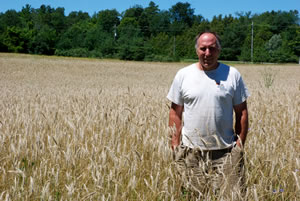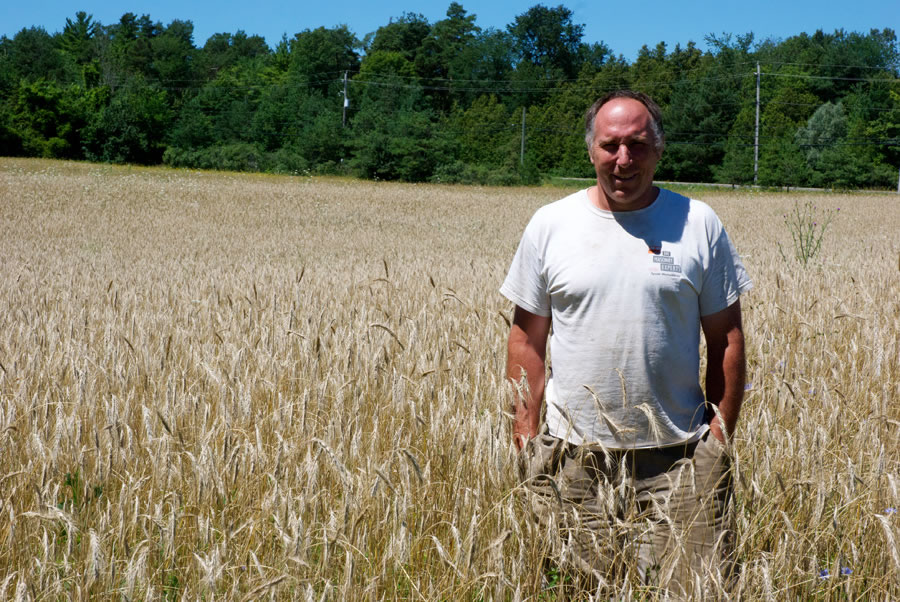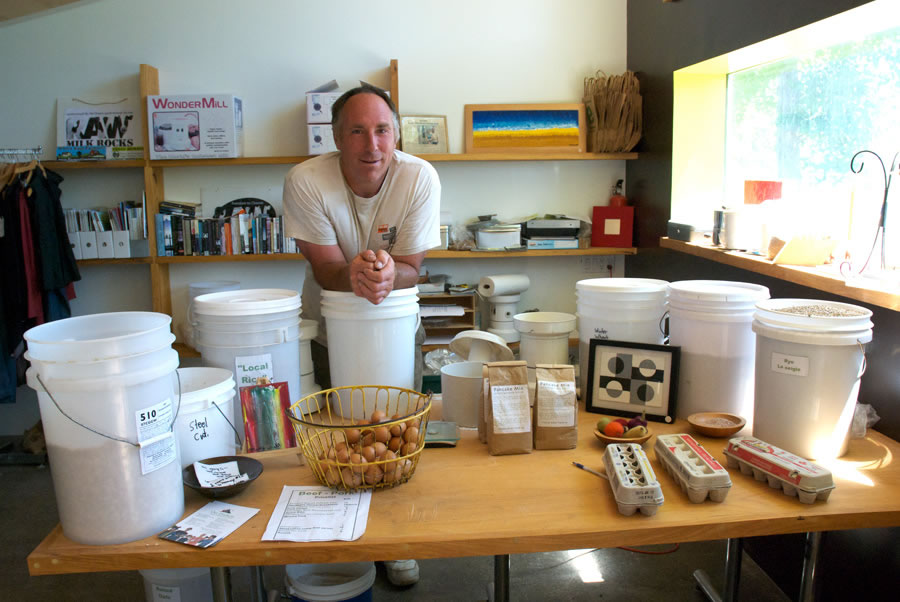Castor River Farm - Metcalfe ON
Listing Contact:
Email: castorriverfarm@xplornet.ca
Website
Location:
613-821-0807
2696 9th Line Road Metcalfe ON K0A 2P0
Whole grains and freshly milled flours (oats, barley, hard red spring wheat, winter wheat, spelt, rye, buckwheat, triticale), pastured eggs, meat birds, pork by the piece, some beef, baking mixes, preserves, maple syrup. A select collection of furniture, art, and clothing is also available at the farm store. Store open Sunday afternoons and by appointment.
Profile by theHumm
Date Published: Thu, 01 Aug 2013
Castor River Farm: Going With the Grain
I just put a bowl of rolled oats in the fridge to soak overnight with some yogurt, hazelnuts, raisins, cranberries and cherries for tomorrow’s breakfast (see my recipe). Nothing terribly unusual about that, except that rather than coming from a box of Quaker oats or a bulk bin somewhere, the oats came (produced and rolled) from a small farm near Metcalfe: Castor River Farm.

Greeting my eyes as I drove up the long tree-flanked driveway of the farm were grazing hens, a pond (complete with a homemade diving board, rope swing, and slide), a gaggle of ducks waddling around its periphery, a lovely old dog barking his notice of me, and a big field to the side with several Large Black sows moving purposely towards the mud puddles, with piglets trotting alongside. I sat on a bench in dappled shade halfway up the laneway, where the farm store is located, and talked with owner George Wright for a good 90 minutes. With three kids, lots of animals, and visiting customers, it’s a pretty happening place on a Sunday!
George Wright and his wife Kim MacMullin have been farming here for about 22 years. They bought the land from George’s parents, built an off-grid house, and started farming. Like many other farmers in the area he grew cash crops conventionally (i.e. grain crops that are primarily sold at harvest in large quantities into the industrial food system). When one year the grain elevator at Port of Prescott stopped buying wheat because a local ethanol plant had rented all the available storage space, George had to dump his year’s harvest. It taught him an important lesson — be sure you can sell what you grow, and if you can’t sell it have other uses for it. It seems obvious, but it’s not common practice in much of today’s farming sector where selling cash crops to a middleman is the end goal.
George transitioned Castor River Farm from conventional to (uncertified) organic practices about a decade ago. Part of this decision was due to his concern about the regular exposure to chemical sprays that farmers, himself included, inevitably experienced. Also, what were sprays doing to the soil and to the food produced?
A holistic approach to farming supports biodiversity and sustainability, as opposed to a monoculture approach which demands a whole different level of engagement, problem solving and conviction. George stated “There are 20 things I can do or need to do to beat the weeds. Conventional farmers can just spray. But is that sustainable in the long term?”
Today the farm supports a web of mutually beneficial relationships on micro and macro levels. It is not without its challenges. Finding and implementing organic solutions to problems when considering the complexity of a whole ecosystem is time consuming. Agricultural research in Canada prioritizes industrial agriculture. Seeds, chemicals, machinery and technologies are all developed for large scale, industrial production of a few crops — namely wheat, oats, canola, corn and soybeans. It is difficult to find needed research, resources, equipment and support suited to small-scale, diversified organic grain producers.
I asked George about this and how, despite this, he has learned about small-scale organic grain production. He told me there are several associations that circulate information and convene regularly, such as Northern Grain Growers Association (NGGA) in Vermont, and Organic Grain Research and Information-Sharing Network (OGRIN) in New York State. Farming mentors/gurus Joel Salatin and Will Allan have been inspiring and influential. He also credits a nearby conventional farmer he’s worked with, Joe Stachon, from whom he has learned a lot over the years — not the least of which has been bookkeeping. Surprisingly too, podcasts are a valuable tool for learning. “I can listen to them while doing the dishes!”
Growing food-grade organic grain production for sale directly to consumers is the farm’s main goal, but pastured chicken, eggs, pork, a bit of beef, maple syrup and the preserves that Kim makes are also sold. Rather than grow large amounts of a couple of cash crops (corn and soybeans are prevalent here) where external inputs are high and costly (fertilizer, sprays, seeds, fuel), and everything seems to be “taken off” the land, Castor River harvests relatively small crops of numerous grains (see list at right). The grains are selected based on their availability (it’s not always easy to find seed), their suitability to organic practices, their resistance to weather (stalk length and width) and disease problems, their taste, their hullability, and their potential appeal/use to the customer. Their animals (pigs, ducks, dairy cows, chickens) play an integral role on the farm and are also selected according to their ability to cycle nutrients (in the form of manure) back to the soil, to utilize “waste” by-products (whey, any grain unsuited for food grade sales, straw) and to generate meat and eggs for the family and customers.
Selling directly to the consumer is now George and Kim’s modus operandi. Currently, farmers’ markets in Manotick and Ottawa, and their on-farm store, are the main venues for their sales. George is definitely not shy on ideas and areas for further experimentation — both in potential products to market (dried beans for soup mixes, mustard seed, homemade cereals) and in cultivating alliances with local entrepreneurs like bakers and brewers wanting to source raw ingredients locally. However, finding committed partners doesn’t happen overnight and new ideas (like using local spelt, or rye for artisan bread-making, or barley malt for brewing) take time to ferment once the seed (of an idea) is planted. Perseverance and patience will hopefully lead to fruitful outcomes.
Ready to start baking? Consider a trip out to the farm on Sundays or catch George and Kim at market to pick up some milled-on-the-spot organic flours, eggs, and rolled oats. Feeling lazy? There are also prepared mixes for pancakes and cookies available. What I’ve outlined is only a taste of what’s available from this interesting gem of a farm. Also be sure to check out their great website for much more information and inspiration.
Postscript: Today’s muesli was scrumptious…
Get in touch
For full contact details, visit theHumm's Local Directory.
Local Food Gallery Castor River Farm


- Toonies for The Table Support Perth’s Good Food Bank
- Sharing the Local Love During the Holidays
- Holiday Magic Returns to Mississippi Mills
- The Magic Realismof Toller Cranston
- St. Paul’s Presents A Musical Celebration of Christmas
- Star So Bright
- The Father of the Christmas Bird Count
- A New Chapter for Jeff Banks of JB Arts
- Have Yourself a Merry Literary Christmas
- A Christmas Story: The Musical Riversong Players Bring Holiday Magic to Almonte in December!






